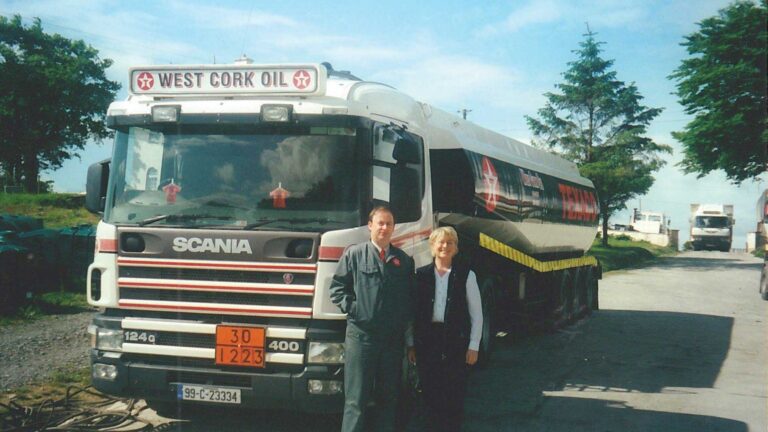
The industry continues its campaign for increased support for HVO uptake, and Pat Murnane, Group Operations Manager for Tria, joined a roundtable discussion at the UKIFDA EXPO in Liverpool in April, to speak on the progress made, and future trajectory for, a greener Ireland. In his well-received contribution to the discussion, Pat suggested he had been invited to speak as ‘an oil distributor that has done something a bit different’.
When Margaret Major, Publishing Director for Fuel Oil News caught up with Pat and the Tria team at the EXPO, it quickly became apparent how much of an understatement that is, as they shared more insight into their own approach to accelerating the HVO roll out.
Tria Energy is the only provider of a full turnkey solution to certification, including verification, with the ISCC (International Sustainability & Carbon Certification), to ensure companies have all the necessary documentation related to carbon savings.
Pat joined the company three years ago, starting in sales and moving rapidly into a management role, around the time HVO first came to Tria as an opportunity. In June 2021, the distributor became the first company to import HVO into the Republic of Ireland on a mineral oil traders license.
Looking back over the last three years, Pat comments: “It’s fair to say that we had a lot of finding our way in the dark. I know myself and Micheál (Kirby – Founder and Chairman of the business) and a couple of our colleagues walked around the industry EXPO two years ago and we walked away saying this was the HVO show. It seemed everybody had their ear trying to figure out how to take advantage, how to diversify.
“On that journey we have had to bring both the Irish government and the customers along with us. It has been a journey of constant excitement, but also a lot of hard work.”
A shared journey
Every member of the Tria Energy leadership team exudes a passion to not only drive uptake of HVO but to also assist those customers making the transition to maximise the benefits of their switch to this clean fuel. And it is not just their customers that Tria is keen to support; the company relishes its role of supporting other distributors to diversify and future proof their businesses.
“We all know the benefits of HVO,” Pat states. “As a direct drop-in replacement for fossil diesel with zero modifications it is a simple change process for the end user if they want to do the right thing.”
But Tria Energy sees a bigger opportunity, as Pat explains: “Right now, in the Republic of Ireland we see it as a viable alternative to electrification, which requires a huge investment in fleet or in transitioning home energy systems.
“HVO offers an opportunity to decarbonise immediately and without the significant CAPEX (Capital Expenditure) considerations.”
It also offered Tria an opportunity to diversify and grow in the liquid fuel market – one that is not always easy to operate in.
“Every distributor knows how tight the kerosene market can be,” Pat comments. “It is a dog-eat-dog game. HVO is a tough game as well, but it has a vital role to play in moving us to a clean future.”
The deep passion for the potential for HVO becomes clearer as Pat shares a story from the Tria journey that has, clearly, had a big impact.
“I was speaking with our founder Micheál Kirby when he came back from the Bloom Festival,” Pat begins. (For those not familiar, Bloom is Ireland’s equivalent of the Chelsea Garden Show and Tria supplied HVO to all the generators last year.) “Micheál could not get over how kids between the ages of six and ten were coming up to him asking how much CO2 per kilogram can be saved by switching fossil diesel for a product like HVO,” Pat continues, remembering his surprise at the shift in youth mentality given that, at the age of ten his mind was occupied with such important considerations as: “Will I win my next football game, does that girl sitting the other side of the classroom actually like me or not and who is on the next soccer magazine cover.”
Clearly inspired, the sense of ‘responsibility to do the right thing for next generations’ was established and became ‘a big change driver for us’ Pat shares.
“It continues to help us when we are making key decisions in our business as well and our key statement is that we are not selling fuel – we are selling a service.
“We have really drilled into that concept over the last two years and it is at the core of our company. We want growth, but we want our customer to be at the centre of that growth and at the centre of everything we do.”
We’re not just selling a litre of fuel: “From the start, we built the business on the principle of doing the right thing by the customer. Keeping this as our company focus has seen us become one of Ireland’s main HVO distributors, but has also led to the introduction of a new audit trail within our business.
“We are ISCC certified and verified, and we ensure our customers get the certification and verification they need to offset their carbon footprint and carbon savings with their verifiers.
“We are moving away from the traditional emphasis of ‘selling a litre of fuel’ and moving to support our customer through the transition as much as we can. The buyer has changed.
They are coming out of universities, such as Oxford or Cambridge with sustainability degrees. The role has changed. You’re no longer selling a litre of fuel, you’re now dealing with the sustainability manager.”
And it is not just the customers that are on a transitional journey. “We have also had to diversify our team,” Pat explains. “This hasn’t been a simple process. As a management group we did not have all the answers and we had to bring in new team members with specific skill sets and knowledge that would help us grow in the emerging market. We know heating oil, diesel, petrol… – we’ve been doing that for 30 years, but we also knew we could move HVO. We had the intellectual horsepower, but we needed a few key members to come into our team to help us move that forward.
This is the point where Tria went beyond ‘tweaking’ the business and made a significant cultural shift. Pat explains how this encompassed bringing in people with new skills for renewable liquid fuel, sustainability and engineering. “We now have eight people fully focused on HVO in our business including people like Ged Kennedy (formerly Green Biofuels) who brings a wealth of knowledge.
“We also have had a change at director level with our board director, Patrick Kirby, stepping up to a new CEO role in the company. He brings an abundance of energy and commitment and his experience in the US tech market over the last nine years has challenged our team to think outside the box.”
Throughout my conversation with Tria, Patrick reinforces Pat’s enthusiasm with an almost evangelistic zeal, leaving no doubt over the impact he has had on the pace of change at the business – a change fully embraced by Pat and the broader management team.
“The fuel industry can be really, really slow to adapt,” Pat observes. “One of the most common statements that my directors would feedback to me, whenever change was attempted, was ‘but we’ve always done it this way’. “That is one statement that just has not existed in Tria in the last two years,” Pat adds, with evident relief. “There’s no point. If we’re going to protect ourselves and future proof, we have to be forward thinking.”
Pat is also keen to look forward with others, actively seeking to bring fellow distributors along on the journey and he has a clear message for them: “I encourage you to follow Patrick’s lead and embrace change. Any distributor that has worked with us will tell you that Tria is not interested in doing this alone, we want to bring others with us. We want to support your business.
“The liquid fuel industry in Ireland has been at the centre of a considerable number of homes for many generations, and that can continue, thanks to the excellent work being done by key members of the industry to offer a real solution. We have a genuine opportunity to future proof our businesses.”
What else is needed to enable distributors to grasp this opportunity to future proof their business in this way, I ask?
“What do we want from the government?” Pat considers. “In the oil game, it all comes down to price. Half a cent is the make and break on any litre of oil and can change your bottom line. But, while price is important to us, what we want from government is support, and when that support does come, clear direction on that support.
“As a company, we are three years down the line of bringing this product to the table.
We have the solutions ready to go. There is no silver bullet. There is a place for heat pumps, there is a place for every other type of industry in this as well.
“We have countless companies that, when we present the benefits of HVO, the service we can provide, the certification and verification, they are happy to proceed and make the switch. The final part of the sale is on an excel sheet bottom line – what’s this costing me?
“We need that support for companies, to make the decisions easier, because we have the solutions there ready to go. The Government has caused so much confusion in the last two years with vat, excises, rebates and the diesel rebate scheme that have just made it awkward.
“I would like to see the government ask industry leaders what the best route forward is, involve us and there will be solutions ready to go the following morning.”
What is the future for Tria?
“It’s all about the team. We have evolved a team that has supply nous and engineering nous as well as being able to answer issues around storage, supply, certification, logistics etc. A traditional oil company has two areas – operations and sales – now you also need engineering, certification and audit.
“We will continue to challenge the status quo, to differentiate between simply selling HVO and giving customers all the info they need to claim the certification as a full migration partner. This is where we have differentiated ourselves.”
Taking a unique approach to the HVO challenge, Tria Energy has established itself as a company in the vanguard of liquid fuel transition. However, our conversation was a real insight into an energy company where the dramatic evolution taking place encompasses so much more than a change of fuel.
With geographical expansion and a new brand just around the corner, we will hear further about developments, beyond involvement in Ireland’s HVO success, in a future issue, as we continue to follow Tria Energy’s exciting journey navigating the liquid fuel transition.
Image credit: Tria Energy
